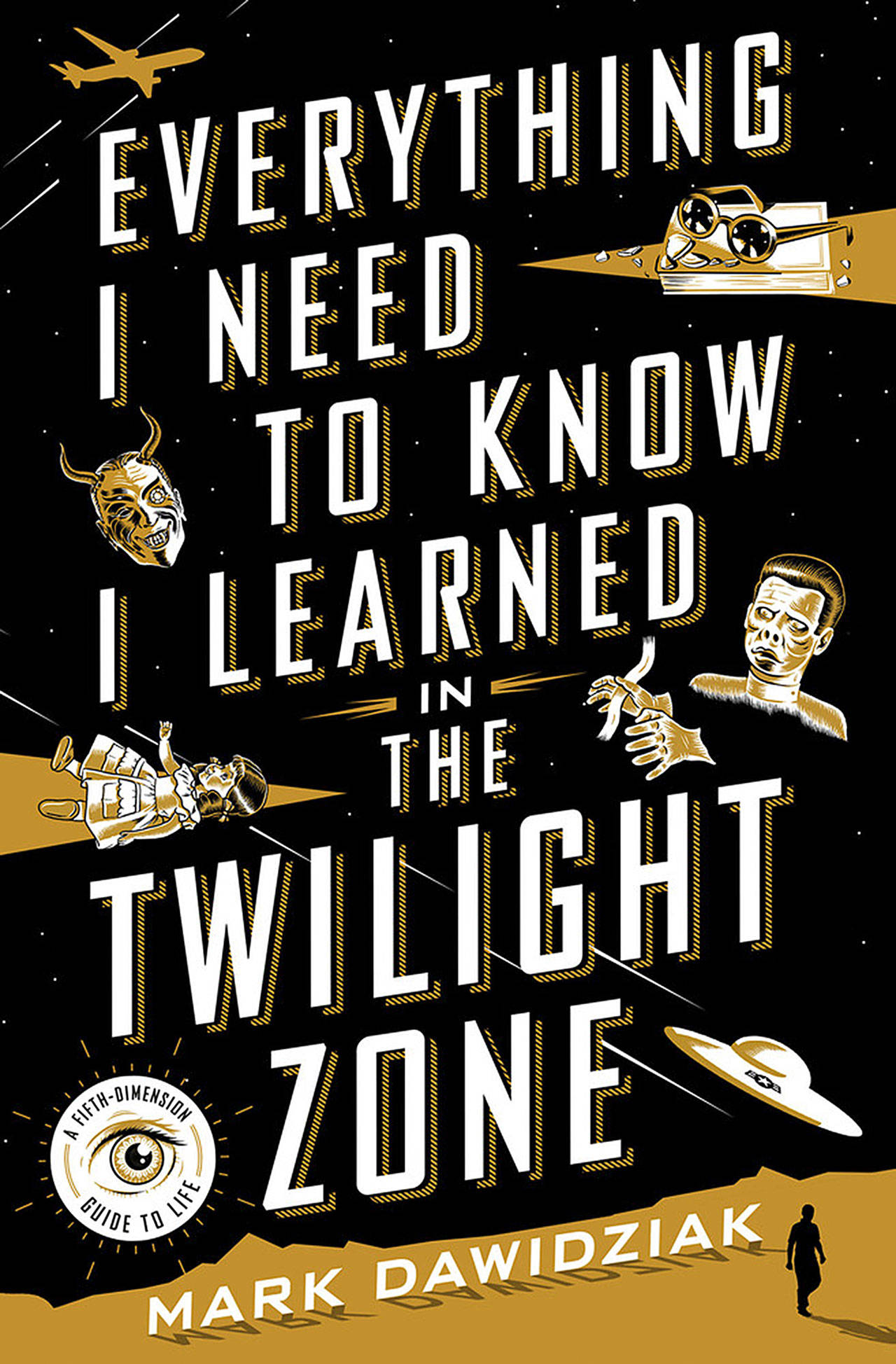By Clint O’Connor
Akron Beacon Journal
“The Twilight Zone” remains one of the freakiest TV shows of all time.
Nearly 60 years after it first aired, many still see Rod Serling’s anthology series as the pinnacle of 30-minute storytelling, with its chilling mix of fantasy, horror and sci-fi, excellent writing and twisty, brain-bashing endings.
Mark Dawidziak sees something else: life lessons.
The writer, critic and longtime Cuyahoga Falls, Ohio, resident took his love of the show and turned it into his latest book, “Everything I Need to Know I Learned in the Twilight Zone.”
Dawidziak presents 50 lessons based on multiple episodes like something out of Aesop’s fables: “Count Your Blessings,” “Share With Others,” “Never Cry Wolf,” “Respect Your Elders.”
The show, which lives on in reruns and DVD compilations, originally ran on CBS from 1959 to 1964. Serling, who created the series and was its iconic deadpan host, wrote 92 of the 156 episodes. He also recruited a stable of contributors that included star writers Richard Matheson, Charles Beaumont and Earl Hamner Jr.
“There’s very little writing that jumps generation to generation that actually speaks to people as vibrantly as it did the day it appeared,” Dawidziak said. “You watch ‘The Twilight Zone’ and the resonance is just the same as the date it aired.”
He refers to the book as a tribute to the show “wrapped in a self-help book.”
A deal with the devil gone wrong in the episode “Escape Clause” becomes a lesson about the careful reading of contracts. The unnerving “To Serve Man,” in which aliens transport humans to their planet in order to eat them, becomes “Never Judge a Book by its Cover.” The classic “Nightmare at 20,000 Feet,” starring a pre-“Star Trek” William Shatner as a man hallucinating (or is he?) on an airplane, manifests into a lesson about believing in yourself.
“Everything I Need to Know” is a breezy, relatable account not only of the episodes and their lessons, but also of the cavalcade of performers who helped make the show so memorable: from Burgess Meredith, Jack Klugman and Art Carney, to Robert Redford, Inger Stevens, Telly Savalas and Carol Burnett.
Dawidziak also reached out to famous folks to provide an eclectic melange of “guest lessons,” peppering his pages with insights from Mel Brooks, Dick Van Dyke, astrophysicist Neil deGrasse Tyson, “The Walking Dead“’s Greg Nicotero and Sopranos creator David Chase, among others.
“I did not see ‘The Twilight Zone’ in its original run,” Dawidziak said. “I was a little young. I discovered the show in 1966 (in reruns) when I was 10 years old. At that age, I fell in love with the show for the reason anyone that age would — it was cool!”
As he got older, he started to sense the morality plays tucked inside many episodes. In 2011, after joking about the show’s life lessons with his then teenage daughter Becky, he had one of those “Hey, there might be a book in this” moments.
Apparently, Dawidziak has had many such moments.
He has written or edited 15 books, and served as co-writer and co-editor on five others, about everything from Columbo to Dracula to Mark Twain.
Dawidziak, who shares Twain’s shaggy white-silver hair and mustache, has performed many times as the author in plays produced by the theater company he founded with his wife, actress Sara Showman.
Dawidziak’s journalism career has included stints in Virginia, Tennessee and Washington, D.C. He covered TV and movies at the Beacon Journal from 1983 to 1999, and has been the TV critic at the Plain Dealer in Cleveland for the past 18 years.
Like Serling, he grew up in New York (Dawidziak on Long Island, Serling in Binghamton), and both found their way to Ohio.
Serling, a paratrooper during World War II, studied language and literature at Antioch College in Yellow Springs, Ohio. After graduation in 1950, he became a writer for WLW radio in Cincinnati (for $90 a week). He continued to live in Ohio until 1954 before turning his attention full-time to television, moving to New York and later Los Angeles.
He churned out loads of scripts, including the towering dramas “Patterns” and “Requiem for a Heavyweight,” before creating his own show. One of Serling’s most notable speeches, touching on the Vietnam War and America’s raging protests, was delivered in Akron in 1971, and Dawidziak closes “Everything I Need to Know” with excerpts from it. (Serling died in 1975 at age 50 following open-heart surgery.)
Reading the book now, in the midst of headlines about immigration bans, you can’t help but be struck by the timelessness of several episodes concerning stereotyping, paranoia and fears of “the other.”
“There is no political agenda to ‘The Twilight Zone,’ except that Rod was passionate about things he thought everybody should be passionate about — prejudice, racism, bigotry, ignorance,” Dawidziak said. “There is a moral center to ‘The Twilight Zone.’ Like Mark Twain, Serling was a moralist in disguise. The same way Twain used humor, Serling used fantasy.”
The show was also exceedingly influential. “It led directly to Star Trek,” Dawidziak said, “and then you had ‘The Prisoner,’ ‘The Night Stalker,’ ‘Twin Peaks,’ ‘The X-Files,’ ‘Buffy the Vampire Slayer.’”
And who are the descendants of Serling today?
“America’s playhouse is primarily the cable drama and has been since the dawn of ‘The Sopranos’ in 1999,” he said.
“You look at people like David Chase (‘Sopranos’), Matthew Weiner (‘Mad Men’), David Simon (‘The Wire’), Vince Gilligan (‘Breaking Bad’). Those guys are the great, illuminating American writers. They are the ones defining and examining the American soul the way Arthur Miller did in the 1950s, or John Steinbeck did in the 1930s.”
“And if you ask those guys, ‘Who is the writer who most influenced you?’ the name that keeps coming up, over and over again, is Rod Serling.”
Talk to us
> Give us your news tips.
> Send us a letter to the editor.
> More Herald contact information.

























